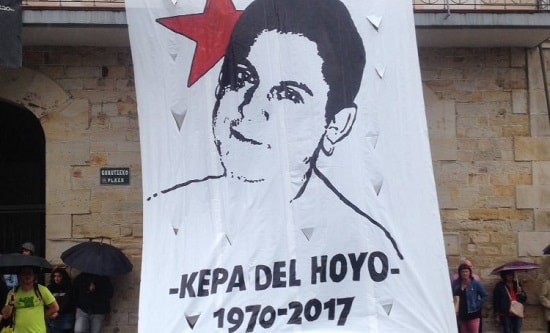
Ever since the end of the Spanish Civil War, when thousands of political prisoners contracted serious illnesses, with many dying, the Spanish state has pursued a deliberate policy of using prisoners’ physical and mental ill-health against them in an attempt to force them to capitulate and renounce the causes they have spent their lives fighting for. Today there are a high number of prisoners whose illnesses have worsened to such an extent that they could die at any time or who, if they live, will suffer serious after-effects or disabilities. Since 1979, 22 political prisoners have died, with another 17 dying within the first few months after their release. Prisoner MARTIN POUCE reports.
Prison conditions, transfers and treatment
The economic crisis and health care cutbacks have had a serious negative effect on the working class as a whole, so in prison the situation has become extreme, with diagnostic tests cancelled or delayed, reductions in healthcare staff, hospital closures, restrictions on medication and vaccines, insufficient food rations, and a lack of cleaning and hygiene products. One newspaper reported that ‘the daily food budget for a prisoner is €3.55, most of which is set aside for pre-cooked food’. Some comrades report that they often have to throw away the food in their trays as it is inedible, and then have to spend their own money on food if they wish to eat.
Prison makes you sick
All this becomes much worse for prisoners who are sick and are serving really long sentences. Spending so many years in prison as they grow old is very detrimental to their health. Added to this, most political prisoners serve the majority of their sentences in solitary confinement units with special protocols designed to cut them off from normal life via all kinds of restrictions: exercise limited to three hours in a tiny yard, no access to arts and craft activities, a limit of two books in possession, and a prohibition on leaving the unit to attend any physical, cultural or social activity.
To this, we have to add the ‘dispersal policy’, which consists not only of transferring political prisoners very far from their families but, most importantly, of segregating them from the comrades of their political organisations. All kinds of communication are censored: letters, phone calls, visits, etc, which increases prisoners’ risk of developing physical and psychological illnesses.
In addition, political prisoners face other special measures when it comes to accessing medical attention. This creates endless obstacles under the guise of ‘security measures’. Transfers to hospital take place in inhuman conditions, with prisoners transported in police vans without seats, handcuffed behind their backs, causing frequent accidents. They remain handcuffed when seeing the doctor and civil guards usually remain in the consultations, violating prisoners’ rights to confidentiality. In response to this humiliation, some prisoners have refused medical attention.
Growing old behind bars
There are currently 30 political prisoners who have served more than 20 years and ten who have served more than 25 years. We are talking about prisoners who are serving sentences of 30 to 40 years.
The average age is progressively increasing so there are some political prisoners over 60 and even 70 years. Their number will continue to increase in the coming years. The situation of these comrades, who have been locked up for many years, is rapidly worsening. These prisoners have carried out and continue to carry out innumerable acts of struggle in standing up for their rights and dignity. Their struggle did not end when they were arrested but continues to this day within the prisons. On top of the torture they suffered at the hands of the national police and civil guards when they were arrested, they have faced physical abuse in prison, as well as the toll of 30 years spent on hunger strikes and protests, and in solitary confinement.
As a result of the fight they have endured in prison, comrades such as Juan Manuel Hernandez, Milagros Caballero and Ramon Foncubierta are wheelchair bound and suffering from incurable illnesses.
Inadequate medical care as a weapon of extermination
Some months ago, the Spanish Interior Ministry announced that political prisoners who continued to espouse their cause would never be set free. Following this announcement, prisoners who are suffering psychological problems started being blackmailed to abandon their revolutionary stances. Some of these vulnerable prisoners are also being beaten up either by guards or by social prisoners doing the guards’ bidding.

In this way, inadequate medical attention has become a way for the state to exterminate revolutionaries, as the most recent examples show: Kepa del Hoyo [2017] and Jose Ortin [2009] died waiting for a medical diagnosis, and Isabel Aparicio [2014] died waiting for treatment after being diagnosed with a serious illness. Manuel Perez (‘Arenas’), who is over 70 and serving a 40-year sentence is going blind after not receiving adequate aftercare for cataract operations. Others, such as Lucio Garcia Blanco and Juan Garcia Martin, also suffer from serious sight problems, as does Victoria Gomez Mendez, aged 66, who has undertaken more than 20 hunger strikes. This impedes them from carrying out revolutionary activity in prison in the only way that they can: through reading, writing and studying. This is another way to destroy them.
The aim of this fascistic strategy is to drive political prisoners to death’s door, so that the state can then blackmail them into backing down from their revolutionary principles. This is why we have to strengthen our fight to achieve their freedom without any conditions. They went in as fighters and it is our duty to help them come out as fighters.
Marcos Martin Pouce, CP Valencia III, 46220 – Picassent, Valencia SPAIN
More information at www.presos.es




